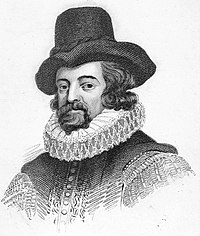
"Ipsa Scientia Potestas Est" [latín]Sir Francis Bacon
Francis Bacon in Meditationes Sacræ. De Hæresibus. (1597)
English author, courtier & philosopher (1561 - 1626)
[EN]
[ES]
"(Tener) Conocimiento es (tener) poder"[DE]
"Wissen ist Macht"[FR] Controverse Citations
«La connaissance est en elle-même puissance»
Bacon's real claim to fame is: not that he, as the lord chancellor, in 1621, was removed from office for accepting a litigant's bribe; nor, that he was the real writer of the Shakespearean plays (one of the controversies in English literature, the "Baconian controversy"); but rather Francis Bacon is known as a philosopher, one of the first order. Bacon delineated the principles of the inductive method, which constituted a breakthrough in the approach to science, even though philosophers and scientists of the day, - and seemingly today, yet - repudiated both his theories and methodology, alike. Bacon argued that the only knowledge of importance to man was empirically rooted in the natural world; and that a clear system of scientific inquiry would assure man's mastery over the world.
He was the originator of the expression, "Knowledge is power".
He was quite taken up by the "materialist" theories and the resultant discoveries of both Copernicus and Galileo. Bacon, along with Galileo are known in the literature as "the great anti-Aristotelians who created the 'modern scientific' view of Nature."
He was the originator of the expression, "Knowledge is power".
He was quite taken up by the "materialist" theories and the resultant discoveries of both Copernicus and Galileo. Bacon, along with Galileo are known in the literature as "the great anti-Aristotelians who created the 'modern scientific' view of Nature."


No hay comentarios.:
Publicar un comentario